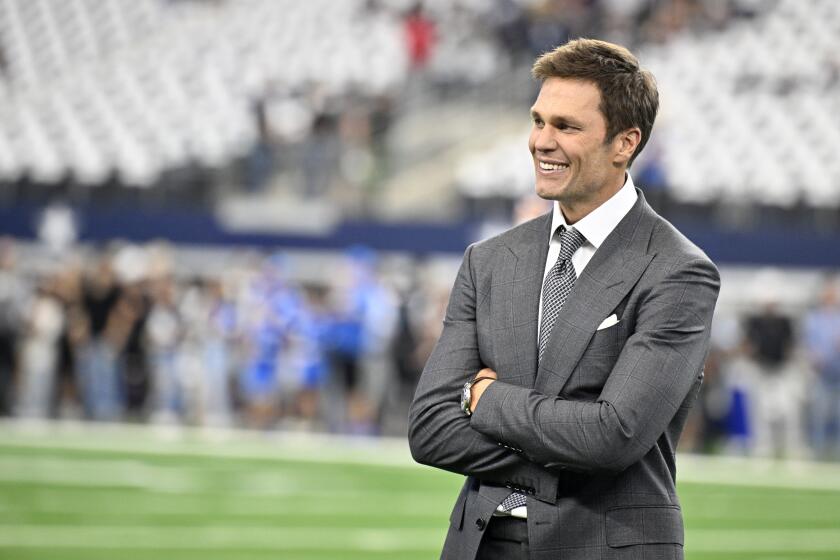Q&A Lorenzo Fertitta: UFC’s full-mount attack
In a decade, Lorenzo Fertitta has helped transform the sport of mixed martial arts from a niche contest dismissed as the activities of hooligans to a major television network deal and a monthly flow of millions of dollars with pay-per-view events in usually sold-out arenas.
The chairman of the Las Vegas-based Ultimate Fighting Championship is preparing for his annual New Year’s weekend card in Las Vegas on Dec. 30, which will feature a heavyweight main event marking the return of popular ex-champion Brock Lesnar versus the massive former champion of the Strikeforce MMA organization, Alistair Overeem.
Fertitta bought out Strikeforce, and the UFC last month made its network debut on Fox with a short heavyweight title fight won by Junior Dos Santos over the man who beat Lesnar, Cain Velasquez.
With a stable of more than 250 fighters, including champions such as Anderson Silva, Jon Jones and the now-injured Georges St-Pierre, Fertitta addressed his company’s future.
In addition to your Fox debut, you’re building another star in Jones, and now have Brock returning. A good start for your second decade?
“Yes, but our biggest issue lately has been 11 of our last 14 main events have fallen out and required replacement fighters. It’s like there’s been a hex over us. So it’s been a challenge to run the business how we’ve planned to. Forcing to shuffle in guys, re-scramble … it takes the steam out of your sails. It helped having the Fox card in there, and, listen, we’re still kicking [rear] by not cancelling shows like boxing would. If we get a stroke of luck with good health here, we’re off to the races.”
You get that with Lesnar’s return. Our website traffic goes crazy when we report about this guy. What is it about him that you believe makes him so compelling?
“He’s a special persona. His look. His size. He gained fame in the WWE, but to see a man of that size be as athletic as he is in the octagon, it captures the imagination of the public in a very strong way.”
Your sport has risen to the prominence of mainstream sports attention moreso than any other over the last 10 years. What are your plans to continue to grow MMA?
“It all starts with this Fox deal, creating this new layer of fans. We’re starting to see that happening and we’re just really getting started to expand into international markets like Brazil, Asia, Europe, Mexico. The challenge is what to prioritize. We’ve added infrastructure — offices in London, Toronto, Beijing. It’s a challenge, but why we’re bringing in real smart people to deal with it. Five years ago, we had 25 to 30 employees. Now we have 250.”
How did you make the Fox deal happen?
“We didn’t have to do a thing. We were like the pretty girl at the dance. We had every major media company talking to us to obtain our rights from our expiring deal at Spike. In the age of the DVR and things like Hulu, when you can watch any show any time you want, sports is really the one asset that’s must-see live television. I know it’s rare that a brand like Fox just jumps right in to something, but they wanted us, and we got a deal done over a weekend.”
Did you make enough money from the deal? And was the fact that the first Fox fight lasted just over one minute a great disappointment?
“You never think you’re getting enough money, but we know we’re still young, still learning. Ten years ago, we’d never done a sports rights deal, and now this? The one fight … we know we can’t continue the magnitude of that fight every time and sustain our pay-per-view business. We’ll continue to balance the portfolio [a three-fight card on Fox in late January]. What we showed that night is that once you’re in the octagon, anything can happen, and how strong these guys are. Plus, there was no controversy at the end.”
The most valuable player of baseball is dealing with a positive test for performance-enhancing drugs. Your sport has been affected by use. How do you address this in a firm way?
“We do a whole program with our fighters, bring in the [Drug Enforcement Agency] to lecture them about the dangers of PEDs. We urge commissions to adopt random testing — at anytime within 48 hours, they have to provide a sample. If a guy knows he’s only getting tested before and after a fight, it’s easy to manipulate. To me, that’s the weakness of other sports, like with the NFL players running from HGH testing. If you encourage testing, embrace it, there’s significantly less perception that you have a safety or credibility issue.”
What stands between your sport and full mainstream sports acceptance?
“Sports media — newspapers — have been late to the party. It’s a bit like what happened with NASCAR. This is what people want. So it’s just a matter of time before these editors realize we have the attention of Generation X and Generation Y. We are the main sport online. That said, I do believe we’re completely accepted as a major sport in the U.S. I still get the past stigmas when I go to other countries, but we’re past that here now.”
twitter.com/latimespugmire
More to Read
Go beyond the scoreboard
Get the latest on L.A.'s teams in the daily Sports Report newsletter.
You may occasionally receive promotional content from the Los Angeles Times.











